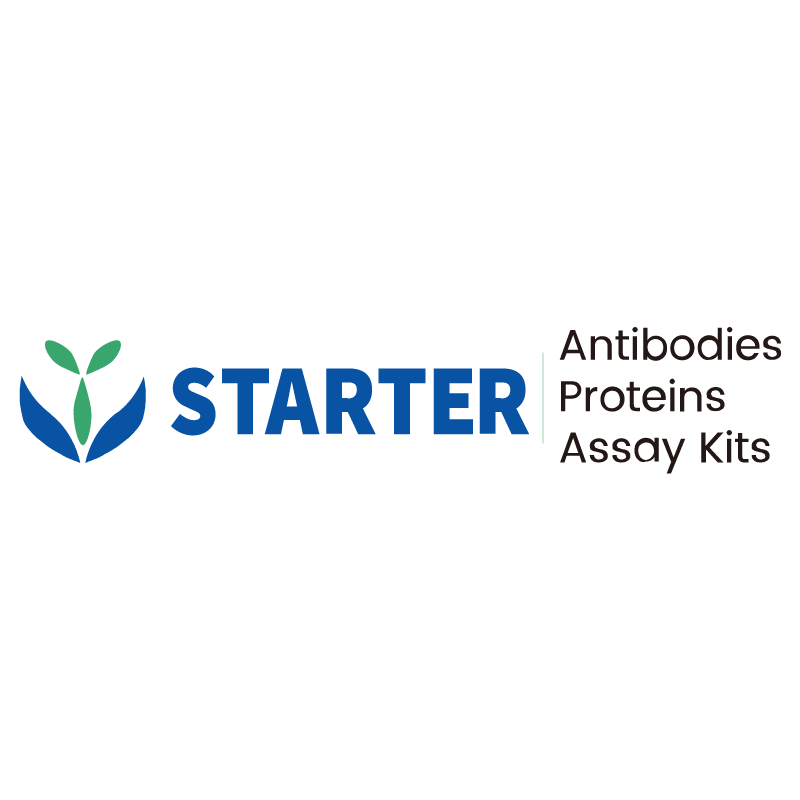WB result of α-tubulin (acetyl K40) Recombinant Rabbit mAb
Primary antibody: α-tubulin (acetyl K40) Recombinant Rabbit mAb at 1/1000 dilution
Lane 1: untreated HeLa whole cell lysate 20 µg
Lane 2: HeLa treated with 400 nM TSA for 16 hours whole cell lysate 20 µg
Secondary antibody: Goat Anti-Rabbit IgG, (H+L), HRP conjugated at 1/10000 dilution Predicted MW: 50 kDa
Observed MW: 55 kDa
Product Details
Product Details
Product Specification
| Host | Rabbit |
| Antigen | α-tubulin (acetyl K40) |
| Immunogen | Synthetic Peptide |
| Location | Cytoskeleton |
| Accession | P68366 |
| Clone Number | S-1536-100 |
| Antibody Type | Recombinant mAb |
| Isotype | IgG |
| Application | WB, IHC-P |
| Reactivity | Hu, Ms, Rt |
| Predicted Reactivity | Bv, Ck, Cz, Hm, Pg, Xe |
| Purification | Protein A |
| Concentration | 0.5 mg/ml |
| Conjugation | Unconjugated |
| Physical Appearance | Liquid |
| Storage Buffer | PBS, 40% Glycerol, 0.05% BSA, 0.03% Proclin 300 |
| Stability & Storage | 12 months from date of receipt / reconstitution, -20 °C as supplied |
Dilution
| application | dilution | species |
| Dot Blot | 1:1000 | |
| WB | 1:1000 | Hu, Ms, Rt |
| IHC-P | 1:500 | Hu, Ms, Rt |
Background
α-Tubulin acetylation at lysine 40 (α-tubulin K40ac) is a post-translational modification that marks long-lived microtubules and plays a role in various cellular functions. This acetylation is associated with the stabilization of microtubules, particularly in structures like axons and cilia. It is believed to influence microtubule dynamics, potentially by affecting lateral interactions among protofilaments and increasing microtubule stability. α-Tubulin K40 acetylation is also implicated in intracellular transport, cell division, and cell migration, as well as in neuronal development, including axonal transport, neuronal migration, and axonal growth. Furthermore, it has been suggested that acetylated microtubules facilitate the transport of the Hippo regulator Merlin, which is crucial for contact inhibition of proliferation and cell-substrate adhesion. The modification is regulated by the acetyltransferase αTAT1 and deacetylases like HDAC6 and SIRT2, and it serves as a stable microtubule marker, enhancing the binding of motor proteins and playing a role in early polarization events in neurons. Deficiency in α-tubulin acetylation has been linked to impaired axonal transport and neurodegenerative disorders. Thus, α-tubulin (acetyl K40) is critical for maintaining the structural integrity of microtubules and regulating key cellular processes.
Picture
Picture
Western Blot
WB result of α-tubulin (acetyl K40) Recombinant Rabbit mAb
Primary antibody: α-tubulin (acetyl K40) Recombinant Rabbit mAb at 1/5000 dilution
Lane 1: untreated NIH/3T3 whole cell lysate 20 µg
Lane 2: NIH/3T3 treated with 500 ng/ml TSA for 4 hours whole cell lysate 20 µg
Lane 3: mouse brain lysate 20 µg
Secondary antibody: Goat Anti-Rabbit IgG, (H+L), HRP conjugated at 1/10000 dilution Predicted MW: 50 kDa
Observed MW: 55 kDa
WB result of α-tubulin (acetyl K40) Recombinant Rabbit mAb
Primary antibody: α-tubulin (acetyl K40) Recombinant Rabbit mAb at 1/5000 dilution
Lane 1: untreated C6 whole cell lysate 20 µg
Lane 2: C6 treated with 500 ng/ml TSA for 4 hours whole cell lysate 20 µg
Lane 3: rat brain lysate 20 µg
Secondary antibody: Goat Anti-Rabbit IgG, (H+L), HRP conjugated at 1/10000 dilution Predicted MW: 50 kDa
Observed MW: 55 kDa
Dot Blot
Dot blot result of α-tubulin (acetyl K40) Recombinant Rabbit mAb
Lane 1: α-tubulin K40 acetyl peptide
Lane 2: α-tubulin K40 acetyl peptide
Lane 3: α-tubulin K40 unmodified peptide
Primary antibody: α-tubulin (acetyl K40) Recombinant Rabbit mAb at 1/1000 dilution
Secondary antibody: Goat Anti-rabbit IgG, (H+L), HRP conjugated at 1/10000 dilution
Immunohistochemistry
IHC shows positive staining in paraffin-embedded human kidney. Anti-α-tubulin (acetyl K40) antibody was used at 1/500 dilution, followed by a HRP Polymer for Mouse & Rabbit IgG (ready to use). Counterstained with hematoxylin. Heat mediated antigen retrieval with Tris/EDTA buffer pH9.0 was performed before commencing with IHC staining protocol.
IHC shows positive staining in paraffin-embedded human colon cancer. Anti-α-tubulin (acetyl K40) antibody was used at 1/500 dilution, followed by a HRP Polymer for Mouse & Rabbit IgG (ready to use). Counterstained with hematoxylin. Heat mediated antigen retrieval with Tris/EDTA buffer pH9.0 was performed before commencing with IHC staining protocol.
IHC shows positive staining in paraffin-embedded mouse liver. Anti-α-tubulin (acetyl K40) antibody was used at 1/500 dilution, followed by a HRP Polymer for Mouse & Rabbit IgG (ready to use). Counterstained with hematoxylin. Heat mediated antigen retrieval with Tris/EDTA buffer pH9.0 was performed before commencing with IHC staining protocol.
IHC shows positive staining in paraffin-embedded rat cerebral cortex. Anti-α-tubulin (acetyl K40) antibody was used at 1/500 dilution, followed by a HRP Polymer for Mouse & Rabbit IgG (ready to use). Counterstained with hematoxylin. Heat mediated antigen retrieval with Tris/EDTA buffer pH9.0 was performed before commencing with IHC staining protocol.


